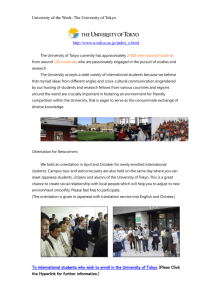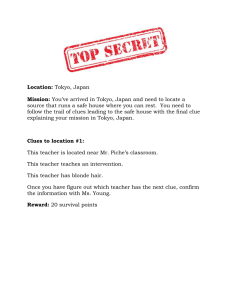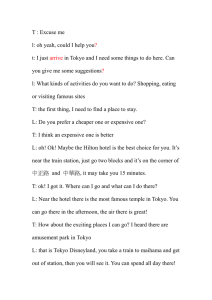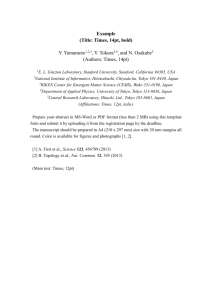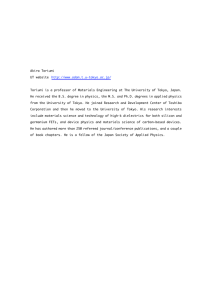The University of Tokyo
advertisement
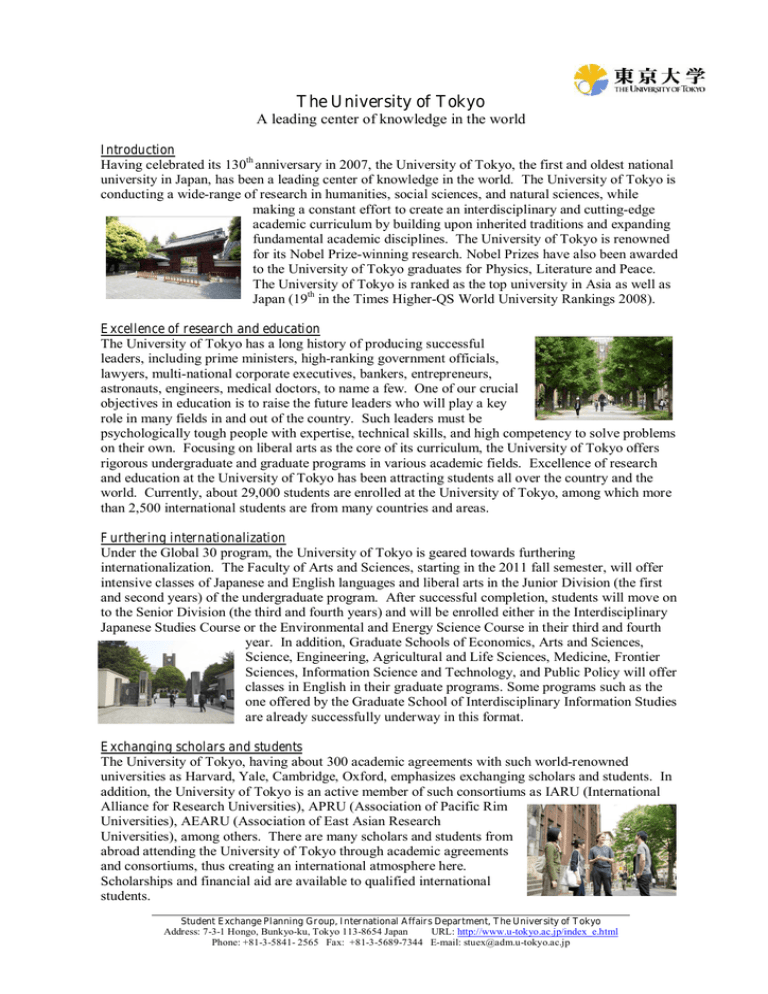
The University of Tokyo A leading center of knowledge in the world Introduction Having celebrated its 130th anniversary in 2007, the University of Tokyo, the first and oldest national university in Japan, has been a leading center of knowledge in the world. The University of Tokyo is conducting a wide-range of research in humanities, social sciences, and natural sciences, while making a constant effort to create an interdisciplinary and cutting-edge academic curriculum by building upon inherited traditions and expanding fundamental academic disciplines. The University of Tokyo is renowned for its Nobel Prize-winning research. Nobel Prizes have also been awarded to the University of Tokyo graduates for Physics, Literature and Peace. The University of Tokyo is ranked as the top university in Asia as well as Japan (19th in the Times Higher-QS World University Rankings 2008). Excellence of research and education The University of Tokyo has a long history of producing successful leaders, including prime ministers, high-ranking government officials, lawyers, multi-national corporate executives, bankers, entrepreneurs, astronauts, engineers, medical doctors, to name a few. One of our crucial objectives in education is to raise the future leaders who will play a key role in many fields in and out of the country. Such leaders must be psychologically tough people with expertise, technical skills, and high competency to solve problems on their own. Focusing on liberal arts as the core of its curriculum, the University of Tokyo offers rigorous undergraduate and graduate programs in various academic fields. Excellence of research and education at the University of Tokyo has been attracting students all over the country and the world. Currently, about 29,000 students are enrolled at the University of Tokyo, among which more than 2,500 international students are from many countries and areas. Furthering internationalization Under the Global 30 program, the University of Tokyo is geared towards furthering internationalization. The Faculty of Arts and Sciences, starting in the 2011 fall semester, will offer intensive classes of Japanese and English languages and liberal arts in the Junior Division (the first and second years) of the undergraduate program. After successful completion, students will move on to the Senior Division (the third and fourth years) and will be enrolled either in the Interdisciplinary Japanese Studies Course or the Environmental and Energy Science Course in their third and fourth year. In addition, Graduate Schools of Economics, Arts and Sciences, Science, Engineering, Agricultural and Life Sciences, Medicine, Frontier Sciences, Information Science and Technology, and Public Policy will offer classes in English in their graduate programs. Some programs such as the one offered by the Graduate School of Interdisciplinary Information Studies are already successfully underway in this format. Exchanging scholars and students The University of Tokyo, having about 300 academic agreements with such world-renowned universities as Harvard, Yale, Cambridge, Oxford, emphasizes exchanging scholars and students. In addition, the University of Tokyo is an active member of such consortiums as IARU (International Alliance for Research Universities), APRU (Association of Pacific Rim Universities), AEARU (Association of East Asian Research Universities), among others. There are many scholars and students from abroad attending the University of Tokyo through academic agreements and consortiums, thus creating an international atmosphere here. Scholarships and financial aid are available to qualified international students. Student Exchange Planning Group, International Affairs Department, The University of Tokyo Address: 7-3-1 Hongo, Bunkyo-ku, Tokyo 113-8654 Japan URL: http://www.u-tokyo.ac.jp/index_e.html Phone: +81-3-5841- 2565 Fax: +81-3-5689-7344 E-mail: stuex@adm.u-tokyo.ac.jp
